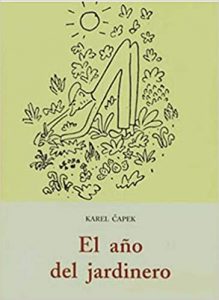To be the father of the Science fiction, or at least a forerunner as far as essential terms like 'robot' are concerned, the thing is that el Karel capek writer is a bit of the old man who has been evicted and forgotten in a residence. Because CiFi glory today belongs to others like Asimov born in 1920, curiously when the word robot was coined for posterity by this Czech writer in his play RUR
Of course, Asimov cannot be accused of being an usurper or an intruder. More than anything because the extensive, exquisite, exuberant (and all the terms with x that we could find) of Asimov's work establish him as the absolute protagonist of science fiction as literature and as a projection not so far removed from the possibilities of our world.
But without Capek perhaps the laws of robotics would not be as we know them now. Because every beginning of an idea triggers the imagination of one's own and other people's ingenuity. And while everything is to raise new hypotheses without stepping on what has already been created, it is fair to recognize Caesar what belongs to Caesar.
Top 3 recommended novels by Karel Capek
Ru.
Dystopias are not the result of chance but arise from the worst notions of reality, imagined and enhanced (sometimes even underestimated) from a reality in whose social failures sinister visions of the future are predicted ...
The massive productions of robots at the Rossum factory have created a more pleasant life, as well as great problems: humanity has stopped reproducing and robots are sent to war.
Helena Glory comes to Rossum Universal Robots with a mission: to help the robots, only to find that they feel nothing and that they look exactly like any human.
In her quest to give them the freedom that she believes they should enjoy, Helena's ambitions will be dashed by reality when the robots begin to revolt. This is the work that would spread the word robot worldwide, but it is also one of the first dystopias written.
The War of the Salamanders
The fable or personalization to disguise a plot of anticipation, a dystopia or any cifi narrative may also start from the Capek on board this disconcerting novel. A plot in which to find those sinister parallels that the complete departure from focus allows. Some moment of humor, a slow but sure advance that hooks and fascinates towards a surprising outcome.
Salamanders are peaceful animals whose abilities captivate a humanity that rides on the back of the runaway technological progress of the interwar period. The industry is the first to take advantage of its enormous potential; shortly thereafter, European governments used them to boost trade, gain territory from the sea, and modernize armies. They are provided with tools, knowledge, weapons, and a future that they will take over.
The year of the gardener
The rarity, the whim or the sugar rush. Whatever led Capek to write this book, it undoubtedly comes with a disruptive and surprising tone that is discovered with the charm of the strange and that is read at times with detachment.
More than anything for being out of the angle of its usual scientific themes as it discovers you being passionate about the meticulousness of gardening and its hopes and desires in a flowered garden where you can take a nap under the shelter of a divine creation from the own hands of a simple gardener.
Because the gardener's enjoyment comes after the strenuous work of anger after the storm or hail and the subsequent longing for the water that waters everything from the skies. Humor or sadness according to touch once you yourself are the gardener who knows glories and miseries so everyday and simple.
Survival botany, observation of plant growth as therapy for people without patience. A book that, if you let yourself be carried away, beats you from the cause of surprise ... Everything starts over again in any year, even more so for the gardener and his cycles.



